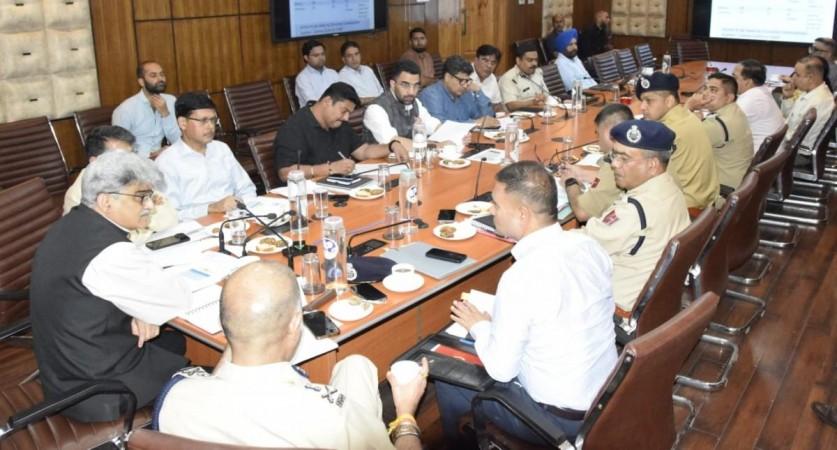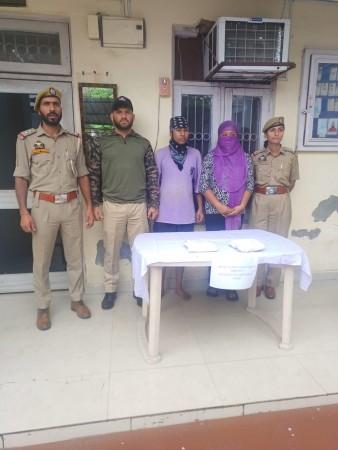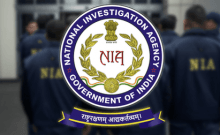
Law enforcement agencies in the Union Territory of Jammu and Kashmir are arresting an average of six drug peddlers every day, with 1,416 individuals booked under the Narcotic Drugs and Psychotropic Substances (NDPS) Act in the last seven months.
The Jammu and Kashmir Police have also identified 220 drug hotspots across the Union Territory, of which 33 have been dismantled by authorities so far.
This information was shared by Inspector General of Police (IGP) Crime, Sujit Kumar, during the 14th UT-level meeting of the Narco Coordination Centre (NCORD), held recently. The meeting was chaired by Chief Secretary Atal Dulloo to review ongoing efforts to combat narcotics trafficking and substance abuse across J&K districts.
Presenting key operational data, IGP Crime informed that 1,032 NDPS cases have been registered this calendar year, leading to the arrest of 1,416 individuals. In addition, law enforcement agencies seized 1,388 kilograms of illicit drugs and over 62,000 psychotropic tablets.
Furthermore, 181 cases under the PIT-NDPS Act were registered, resulting in the arrest of 58 key drug traffickers through thorough backward and forward link investigations. Out of the 220 identified drug hotspots, including 20 newly flagged locations, 33 hotspots were dismantled, and 413 arrests were made from these areas.
In terms of financial action, property attachment proceedings were initiated in 45 cases, involving 35 buildings and 13 vehicles linked to the drug trade. Assets worth ₹39 crore were either frozen or seized, with corresponding entries recorded in land revenue documents, the meeting was informed.
To enhance investigative capabilities, 247 specialized training sessions were conducted, training over 2,150 Investigation Officers (IOs) in modern techniques of handling NDPS cases, with the aim of improving conviction rates.

Taking serious note of the issue, Chief Secretary Atal Dulloo underlined the critical role of comprehensive and timely investigations in NDPS cases. He emphasized that the quality of investigation directly affects prosecution outcomes in courts and called for a stronger focus on ensuring effective judicial disposal of such cases.
The Chief Secretary also reviewed long-pending NDPS cases and directed concerned officers to identify the root causes of delay and implement corrective measures. He instructed the Police Department to submit monthly status reports on all NDPS cases, clearly detailing investigation and prosecution progress, along with the age and stage of each pending matter.
Further emphasizing accountability, he directed that all bail and acquittal cases be jointly analyzed by the Law and Police Departments to identify possible gaps or lapses in the investigation and prosecution process.

Addressing the need for a robust drug de-addiction infrastructure, the Chief Secretary reviewed the availability of treatment facilities across districts. He instructed the Health Department to augment inpatient de-addiction services in Government Medical Colleges and District Hospitals, reducing reliance on private institutions. He also called for capacity enhancement of medical and paramedical staff at the Institute of Mental Health and Neurosciences (IMHANS) to expand service outreach.
During the meeting, Director General of Police (DGP), Nalin Prabhat, stressed the importance of pooling all available human and material resources to comprehensively tackle the drug problem. He also flagged the misuse of courier services for trafficking Schedule-I drugs and suggested implementing stricter surveillance and regulatory controls.
Principal Secretary, Home Department, Chandrakar Bharti, shared insights from the NCORD portal and urged Deputy Commissioners (DCs) and Senior Superintendents of Police (SSPs) to convene regular district-level NCORD meetings. He emphasized timely uploading of meeting agendas, minutes, and action-taken reports. He also presented a district-wise status report of NDPS cases, including those under investigation, challaned, or pending in courts.
The Chief Secretary was also apprised of ongoing awareness campaigns and IEC (Information, Education & Communication) activities, conducted by various departments in coordination with the police. Notably, technological interventions, such as Aadhaar-linked monitoring and dedicated portals for tracking drug prescriptions and patient intake, are being developed in collaboration with BISAG-N to prevent the diversion and misuse of prescription drugs.
Reiterating the government's zero-tolerance policy against narcotics, the Chief Secretary called for a coordinated, proactive, and multi-pronged approach from all stakeholders to eradicate the drug menace from every corner of the Union Territory.








